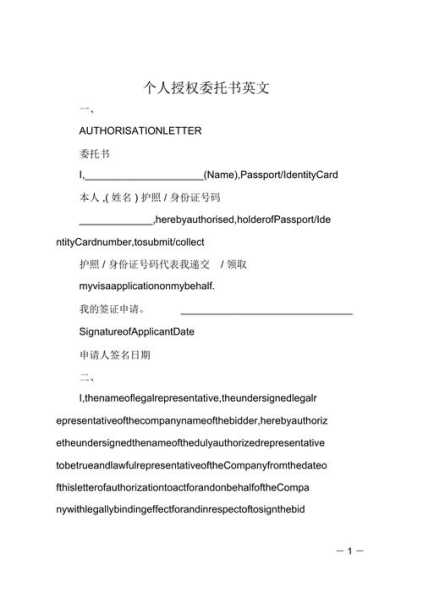This guide explains the personal customs clearance power of attorney, a legal document allowing someone to act on your behalf for customs clearance. It covers key aspects, such as who can be an attorney, responsibilities, and the process.
In the globalized world we live in today, international trade and travel have become more prevalent than ever. With this comes the necessity of navigating through customs procedures, which can be complex and time-consuming. For individuals who may not have the expertise or the time to handle customs clearance on their own, the use of a personal customs clearance power of attorney becomes a valuable tool. This document allows someone to legally delegate the responsibility of customs clearance to another person or entity. In this article, we will delve into what a personal customs clearance power of attorney is, its importance, and how to draft one in English.

What is a Personal Customs Clearance Power of Attorney?
A personal customs clearance power of attorney is a legal document that grants an individual (the principal) the authority to delegate the responsibility of customs clearance to another person (the attorney-in-fact) or entity. This delegation is crucial when the principal is unable to handle the customs process due to geographical constraints, lack of knowledge, or simply because they prefer to focus on other aspects of their business or personal life.
Why Use a Personal Customs Clearance Power of Attorney?
1、Expertise and Efficiency: Customs clearance can be a complex process that requires specific knowledge and experience. By appointing an attorney-in-fact who is well-versed in customs regulations, the principal can ensure that their goods are cleared efficiently and accurately.
2、Time Management: Handling customs clearance can be time-consuming, especially for individuals who have other responsibilities. A power of attorney allows the principal to delegate this task, freeing up their time for other important matters.
3、Geographical Constraints: If the principal is located in a country that does not have a customs office or if they are traveling, it becomes impossible to handle customs clearance personally. A power of attorney allows them to manage their customs obligations from a distance.
4、Legal Compliance: Customs regulations are subject to change, and staying up-to-date with these changes can be challenging. An attorney-in-fact can ensure that all legal requirements are met, reducing the risk of penalties or delays.
How to Draft a Personal Customs Clearance Power of Attorney in English
When drafting a personal customs clearance power of attorney in English, the following elements should be included:
1、Title: Clearly state that the document is a "Personal Customs Clearance Power of Attorney."
2、Principal's Information: Provide full legal names, addresses, and contact information of the principal.
3、Attorney-in-Fact's Information: Include the full legal name, address, and contact information of the attorney-in-fact.
4、Scope of Authority: Specify the extent of the attorney-in-fact's authority. For customs clearance, this may include the right to sign documents, pay duties, and make declarations on behalf of the principal.
5、Duration: Indicate the period during which the power of attorney is valid. This could be a specific date or an indefinite period, depending on the principal's needs.
6、Conditions: Outline any conditions or restrictions that apply to the attorney-in-fact's authority.
7、Revocation Clause: Include a clause that allows the principal to revoke the power of attorney at any time.
8、Signatures: Both the principal and the attorney-in-fact must sign the document. If the document is being notarized, the notary's signature should also be included.
9、Witnesses: In some jurisdictions, the presence of witnesses is required. If necessary, include the names and signatures of witnesses.
10、Acknowledgment: The principal should acknowledge that they are executing the document of their own free will.
Conclusion
A personal customs clearance power of attorney is a vital document for individuals who need to delegate the responsibility of customs clearance. By drafting this document in English, individuals can ensure that their customs obligations are handled efficiently and legally, regardless of their location or expertise. It is important to seek legal advice when drafting such a document to ensure that it complies with all relevant laws and regulations.
相关阅读:
1、Sample Format and Writing Guide for English Power of Attorney Documents
2、Mastering the English Power of Attorney: A Deep Dive into Authorization Deed Essentials
3、Demystifying the English Translation of Real Estate Power of Attorney
4、Unlocking the Personal to Personal Power of Attorney: Your Essential Guide
5、Template and Writing Guide for Handwritten English Power of Attorney Documents
Mastering the English Personal Customs Clearance Authorization Letter: Your Ultimate Guide
Step-by-Step Guide to Drafting a Customs Clearance Power of Attorney: English Template Included
Navigating Customs Clearance: The Essence of English Translation in Power of Attorney Documents
Mastering the English Customs Clearance Authorization Letter: A Comprehensive Guide
Mastering the English Visa Process: The Ultimate Guide with Personal Power of Attorney
Mastering the Art of Drafting a Personal Power of Attorney Letter: English Template Included
Ultimate English Personal Power of Attorney Template: Effortlessly Handle Various Delegated Matters











